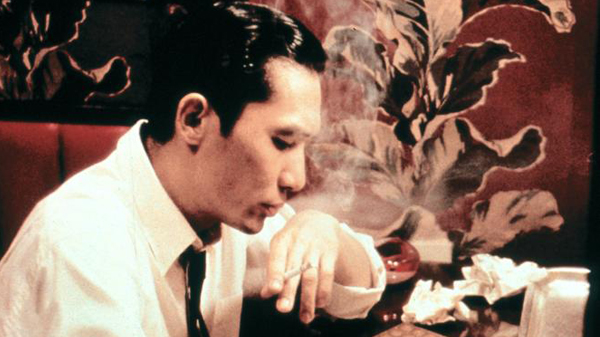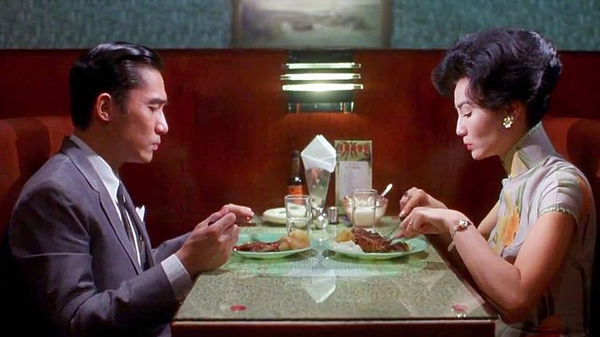READ ME is a platform for female-led writing on film hosted by Girls on Tops. Louisa Maycock (@louisamaycock) is Commissioning Editor and Ella Kemp (@efekemp) is Contributing Editor.
It’s been nearly 20 years since Wong Kar-Wai’s In the Mood for Love has occupied a romantic, collective consciousness. Ava Wong Davies’ personal ode to the film looks into Chinese attitudes towards food.
My mother never finishes her food. She leaves scraps of steamed white fish, rice grains, bits of garlic-fried broccoli on her plate. She tells us she’s hungry, starving even, then picks at her food. I think she gets it from my grandma – she’s always offering food, omelettes with fried onions, rice porridge with stalks of ginger and almost-cloves of garlic, ladling more rice onto our plates then chastising when we eat it all. For the Chinese – for my family at least – food is fundamental to family which is tied up with love which is tied up with shame which is tied up with guilt.
Re-watching Wong Kar-Wai’s In the Mood for Love, I was struck by Maggie Cheung’s character, Mrs Chan, so achingly thin, laced into rigid silk cheongsams, slipping in and out of frame like water down a plughole. If she eats, she eats alone. She refuses her landlady’s persistent requests to have dinner – a landlady who opens the film with the words, “Eat up”, a woman who lives voraciously, eating and gambling with friends every night. We don’t see Mrs Chan eat on her own. She schedules dinners for her boss and his wife, she idly inquires as to what her landlady has made for dinner but quickly declines when she’s beckoned to the table. She walks through the streets, swinging her egg-blue thermos filled with street cart noodles that we never see being consumed.
The first time we see Tony Leung’s Mr Chow eat, he’s cramming an entire wonton dumpling into his mouth: food as distraction, food as a crutch, an excuse to leave a tiny rented room in 1960s smoggy Hong Kong. It isn’t something to be enjoyed, relished, lingered over with the one you love. Mr Chow tries to take his erstwhile wife out for dinner. He offers food as confirmation of commitment and it’s rejected. So, he eats alone.
Wong Kar-Wai said in an interview, “At first, we called the film ‘a story about food.’ [It’s about] two people, neighbours, who are buying noodles all the time”. I don’t think my family consider noodles to be a proper meal. They’re part of it, sure. A big bowl of char meehoon, or kong fu chow – delicious, yes, but alongside steamed vegetables and rice and fish and pu-er tea. Noodles are okay for lunch – but not on their own for dinner. An unrooted food, a temporary fix. Noodles compound the loneliness.
It’s interesting to me that the moment Mr Chow and Mrs Chan realise that their spouses are having affairs with each other is not in the diner scene – the beautiful, iconic scene with the meat and mustard. It takes place a few days prior, in a similar (the same?) diner, over tea drunk in sea-foam green tea cups. There is still some pretence of formality to their relationship, which plays out like a slow, winding dance. Mrs Chan can hide behind teacups when the probing questions come. Mr Chow can duck behind cigarette smoke. To an outsider, the waitress who presumably fills their cups, their conversation doesn’t seem like much. “Where did you buy your handbag?” “Where did you get your tie?”. Knitted underneath, there is a keen ache which never quite comes to the surface, which is stirred away with glinting metal teaspoons. Tea is an easy thing to meet someone for – the contents of a glass or cup or teapot can be drained in under thirty minutes. A meal? Now that’s infinitely more slow, more revealing. Chewing in front of someone you don’t know very well feels terrifying. I couldn’t eat in front of a guy I used to date. That he might see inside my mouth? Horrific.
So when Mrs Chan and Mr Chow do have that meal, it feels… like an exhale. To see them eating with each other, with another lonely, gently spinning moon, makes me feel relieved of some weight I didn’t know was hanging around my neck. She eats a steak, he eats a pork chop. They both have potatoes on the side, and some sort of white, oddly luminescent cabbage. There’s about 20 seconds of silence, just a wide shot, watching them cut their food and chew it and swallow and repeat. Mrs Chan, her back always so rod-straight, relaxes a little into her plate. And then there’s the mustard moment. Mr Chow’s eyes flicker to Mrs Chan’s plate. He reaches to the side, picks up the tiny silver mustard holder, scoops a little out with the spoon, and daubs it on the side of her plate. Her fork, which is raised, lowers then dips her cut of meat into the speckled condiment and pops it into her mouth. And it’s barely anything, but at the same time it is everything. He has offered her a hand and she has taken it.
When they eat rice together, trapped in Mr Chow’s lodgings, unable to leave for fear that it will be assumed that they are having an affair, they sit close, leaning into each other, positions inverted from the diner scene. Her legs almost intertwine with his, but not quite. He holds his paper full of rice in one hand, chopsticks in the other, and they share from the same vessel. A plate of food, presumably hers, sits uneaten on the bedside table. A far cry from the strangers passing each other in the stairwell, pushed together because of circumstance but arching their bodies away from that inevitable, gravitational pull.
Ava Wong Davies (@avawongdavies) is a theatre critic and playwright from London.



